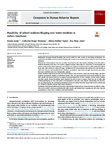Feasibility of school students Skyping care home residents to reduce loneliness
| dc.contributor.author | Zamir, S | |
| dc.contributor.author | Hennessy, CH | |
| dc.contributor.author | Taylor, Adrian | |
| dc.contributor.author | Jones, Ray | |
| dc.date.accessioned | 2021-09-09T09:47:49Z | |
| dc.date.issued | 2021-01 | |
| dc.identifier.issn | 2451-9588 | |
| dc.identifier.issn | 2451-9588 | |
| dc.identifier.other | 100053 | |
| dc.identifier.uri | http://hdl.handle.net/10026.1/17777 | |
| dc.description.abstract |
BACKGROUND: Intergenerational friendship has proved useful for older people in increasing socialisation. We explored the feasibility of school students Skyping older people in care homes with the long-term aim of reducing loneliness. METHODS: Six school students from one secondary school and twenty older people, including seven with mild to moderate dementia, from three care homes, engaged in Skype video-calls over six weeks. A conversational aid aimed to help school students maintain conversations was employed. Students and care staff completed feedback forms after each session on video-call usage, usefulness of the conversational aid, and barriers and benefits of video-calls. Six care staff provided further feedback on residents' experiences through unstructured interviews. Interviews and field notes were thematically analysed. RESULTS: Residents enjoyed Skype-calls with school students. Over six weeks, video-calls became longer, and more residents participated. Analysis revealed four themes. First, the intervention led to increased mobility for three older people and improved self-care in regard to personal appearance for five residents. Second, school students and older people formed friendships which inspired the need to meet in person. Third, the use of video-calls enabled participants to view each other's environments in real time. Last, directly experiencing the intervention was important for the continued participation of the care staff in the study. Skype-calls between schools and care homes are feasible and may help reduce loneliness. CONCLUSIONS: Institutional collaboration between educational settings and care homes through cost effective video-calls can be useful to increase socialisation for older people, and promote later on-going use with other external organisations to help reduce loneliness and social isolation. | |
| dc.format.extent | 100053-100053 | |
| dc.format.medium | ||
| dc.language | en | |
| dc.language.iso | en | |
| dc.publisher | Elsevier BV | |
| dc.subject | Care homes | |
| dc.subject | Dementia | |
| dc.subject | IGS, Intergenerational socialisation | |
| dc.subject | Intergeneration | |
| dc.subject | Intervention | |
| dc.subject | Older people | |
| dc.subject | SoW, Skype on Wheels | |
| dc.subject | Video-calls | |
| dc.title | Feasibility of school students Skyping care home residents to reduce loneliness | |
| dc.type | journal-article | |
| dc.type | Journal Article | |
| plymouth.author-url | https://www.ncbi.nlm.nih.gov/pubmed/34278046 | |
| plymouth.volume | 3 | |
| plymouth.publication-status | Published | |
| plymouth.journal | Computers in Human Behavior Reports | |
| dc.identifier.doi | 10.1016/j.chbr.2021.100053 | |
| plymouth.organisational-group | /Plymouth | |
| plymouth.organisational-group | /Plymouth/Faculty of Health | |
| plymouth.organisational-group | /Plymouth/Faculty of Health/Peninsula Medical School | |
| plymouth.organisational-group | /Plymouth/Faculty of Health/School of Nursing and Midwifery | |
| plymouth.organisational-group | /Plymouth/REF 2021 Researchers by UoA | |
| plymouth.organisational-group | /Plymouth/REF 2021 Researchers by UoA/UoA03 Allied Health Professions, Dentistry, Nursing and Pharmacy | |
| plymouth.organisational-group | /Plymouth/Research Groups | |
| plymouth.organisational-group | /Plymouth/Research Groups/FoH - Community and Primary Care | |
| plymouth.organisational-group | /Plymouth/Research Groups/Institute of Health and Community | |
| plymouth.organisational-group | /Plymouth/Research Groups/Institute of Translational and Stratified Medicine (ITSMED) | |
| plymouth.organisational-group | /Plymouth/Research Groups/Institute of Translational and Stratified Medicine (ITSMED)/CCT&PS | |
| plymouth.organisational-group | /Plymouth/Research Groups/Plymouth Institute of Health and Care Research (PIHR) | |
| plymouth.organisational-group | /Plymouth/Users by role | |
| plymouth.organisational-group | /Plymouth/Users by role/Academics | |
| plymouth.organisational-group | /Plymouth/Users by role/Researchers in ResearchFish submission | |
| dc.publisher.place | England | |
| dcterms.dateAccepted | 2020-12-30 | |
| dc.rights.embargodate | 2021-9-10 | |
| dc.identifier.eissn | 2451-9588 | |
| dc.rights.embargoperiod | Not known | |
| rioxxterms.versionofrecord | 10.1016/j.chbr.2021.100053 | |
| rioxxterms.licenseref.uri | http://www.rioxx.net/licenses/all-rights-reserved | |
| rioxxterms.licenseref.startdate | 2021-01 | |
| rioxxterms.type | Journal Article/Review |


